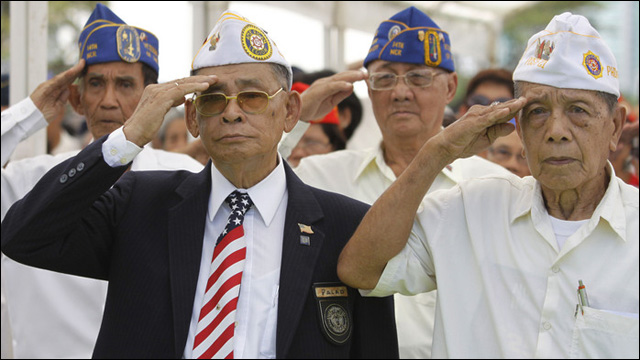The Filipino World War II Veterans Parole Program (FWVP) allows family members of Filipino World War II veterans who have approved I-130 family-based petitions to enter the United States while they await for their visas to become available, at which time they can file for permanent resident status.

The Filipino World War II Veterans Parole Program Reinstated By Biden Administration
In August 2019, the program’ was terminated by the Trump Administration. However, in October 2021, President Biden reversed the termination. New FWVP applications are now being accepted.
Due to the impact of COVID-19, which caused severe processing problems and delays, the U.S. Citizenship and Immigration Services has noted it is not possible to predict it is possible for Filipinos to join their family faster under the FWVP program versus through the regular immigrant visa process.
Nonetheless, as a Filipino immigrants green card lawyer who has assisted many families from the Philippines, the Biden Administration announcement is welcomed news.
What Family Members Benefit From The FWVP?
FWVP benefits are limited to:
- The Filipino veteran’s spouse
- The Filipino veteran’s sons and daughters (and their spouses and unmarried children under 21)
- The Filipino’s veterans’s brothers and sisters (and their spouses and unmarried children under 21)
This means that certain grandchildren, those who are married or over 21 years old, are not eligible for a grant of parole under the FWVP.
Likewise, the children of the veteran’s siblings who are married or over 21 years old do not qualify.
In addition, if you are the son or daughter of the veteran’s spouse, but not the veteran, you do not meet the requirements for FWVP benefits.
However, stepchildren of the veteran qualify if the marriage of the veteran and his spouse took place before the stepchild turned 18 years old.
The brother or sister of the veteran’s spouse do not qualify. Only the brother or sister of the veteran can seek parole under the FWVP.
The program’s roots can be traced to a promise made 75 years ago to Filipino soldiers in 1946.
Who Qualifies To File A Request For Parole Under The FWVP?
Under the FWVP, the following rules govern the filing of a request for parole for qualifying relatives:
- Only a Filipino World War II veteran or surviving spouse of such a veteran can file a FWVP request for parole
- The Filipino World War II veteran or surviving spouse has to first file an I-130 petition on behalf of the qualifying relative, which must be approved before they can file the FWVP request for parole
- The Filipino World War II veteran or surviving spouse is a U.S. citizen or lawful permanent resident living in the United States
- The veteran’s relationship with the family member existed or or before May 9, 2016
- An immigrant visa is not yet available for the qualifying relative.
Problems that may arise include:
- The I-130 immigrant relative petition was not approved before the petitioner, the veteran or surviving spouse, passed away.
- The petitioner, the Filipino veteran or surviving spouse, was not living in the U.S. at the time of death
- The deceased veteran’s term of service has not been recognized by the Department of Defense
- The deceased veteran’s name is not listed at the National Personnel Records Center
What Is Parole?
A grant of parole grants immigrants the ability to temporarily enter the United States, when they lack a legal basis for being admitted. Parole is only granted if the government feels there are urgent humanitarian or significant public benefit reasons that justify allowing that person to be in the United States.
Grants of parole are made for limited periods of time to accomplish a discrete purpose, and individuals are typically expected to depart the United States when the authorized period expires.
Under the Filipino Veterans World War II Parole Program, the grant of parole is allowed for the relatives of World War II to enter the U.S. to take care of aging veterans who defended the United States and now reside legally in the United States.
The FVWP limits grants of parole to three years. If at the end of that period, the parolee is still waiting for a visa in order to apply for permanent resident status, he or she must seek re-parole. This application should be filed about 90 days before the authorized period of parole expires.
Immediate Relatives Exclusion
The requirement that only family members for whom a visa is not yet available are eligible to apply for parole excludes “immediate relatives”.
In short, under immigration law, certain family members of United States petitioners are classified as immediate relatives since they can “immediately” seek immigrant visas for travel to the United States, upon approval of their I-130 petitions.
For a short overview of which family members are immediate relatives and who you can petition for immigration benefits, click here: Family Petitions And Visas.
This category includes spouses of U.S. citizens and unmarried children under 21.
Parents of U.S. citizens over 21 are also classified as immediate relatives and excluded from FWVP eligibility. Given the elderly age of World War II veterans, it is doubtful any of their parents are still alive.
More likely, issues could surface if the petitioner is a lawful permanent resident who then becomes a naturalized citizen. Once this takes place, some Filipino beneficiaries will be classified as immediate relatives.
For instance:
If the FWVP petitioner becomes a U.S. citizen before requesting parole under the FWVP, the government will deny any applications filed on behalf of his or her “immediate relatives”.
However, if the FWP petitioner becomes a U.S. citizen after requesting parole, there are two options how to proceed.
- The immediate relatives can still be processed under the FWVP. Once paroled into the United States, they can immediately apply for permanent residence.
- Or they can choose to be move forward as immediate relatives and seek permanent resident status via processing abroad.
What Happens If The Beneficiary Is Already In The United States?
The Filipino World War II Veterans Program is primarily intended to assist family members who are living outside the United States. Yet, relatives residing in the United States can also apply.
Usually, this will occur when a family member has entered the U.S. lawfully through a temporary visa as a visitor or student.
In many situations, however, family members do not leave the U.S. at the expiration of their authorized stay. As a result, they are now considered “overstays” and they are living here in unlawful status.
This presents a major problem. Once the government conditionally approves the parole application, the family members must attend their interviews in the Philippines.
Those returning home, after living in the United States without permission for more than six months, will trigger a bar to admissibility. This bar prevents lawful re-entry.
To overcome this bar requires filing and winning a I-601 inadmissibility waiver. Success is dependent on demonstrating a U.S. citizen or lawful permanent resident parent or spouse will suffer an extreme hardship if they are not allowed to return to the U.S.
If the World War II veteran is still alive and in need of assistance for daily living functions will help develop the hardship claim. Given the high standards of proof imposed in these types of cases, the veteran’s daily needs, by itself, may not be sufficient for victory.
In short, I-601 waivers are difficult, difficult cases to win. If you’re facing this situation, you should consult with an immigration lawyer to assess your chances before proceeding.
For more information on how to win a hardship case, see: The I-601 Hardship Waiver Guidelines.
The combination of the various issues, outlined above, led to a sluggish start of parole applications filed and parole applications granted. During the intial three years of the program, less than 50% of applications filed had been approved.
Slightly over 1/4 were pending, as of the date of this article.
What Happens If The Filipino Veteran And His Spouse Are Deceased?
Here’s the good news.
When both the veteran and his spouse are both deceased, the veteran’s beneficiaries may file a self-petition to seek parole on their own behalf, as well as on behalf of their spouses and children (unmarried and under 21) – but only if the original I-130 petition is reinstated by the government.
Two possibilities for humanitarian reinstatement exist:
- If USCIS had approved the I-130 filed on behalf of the (now) self-petitioner while the original petitioner (the Filipino World War II veteran or his spouse) was alive, a request for reinstatement might be granted.
- If the I-130 petition filed on behalf of the self-petitioner was still pending at the time of the original petitioner’s death, and the self-petitioner was living in the U.S. at that time and still resides here, USCIS could approve the I-130 under provisions for surviving relative relief.




